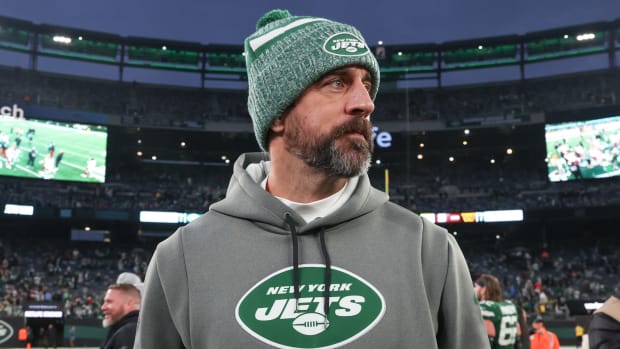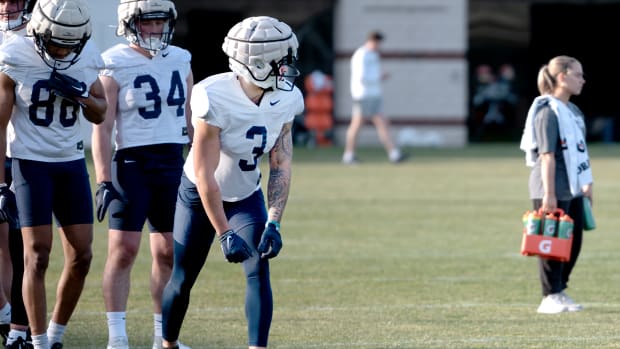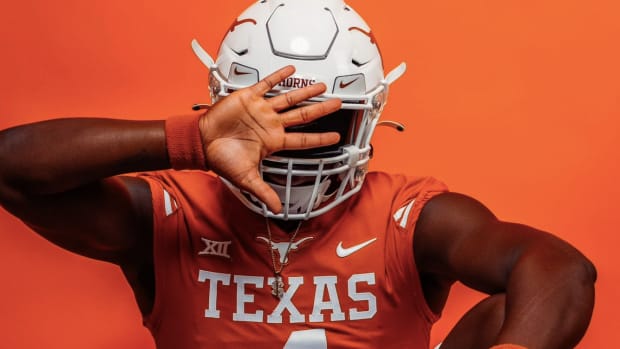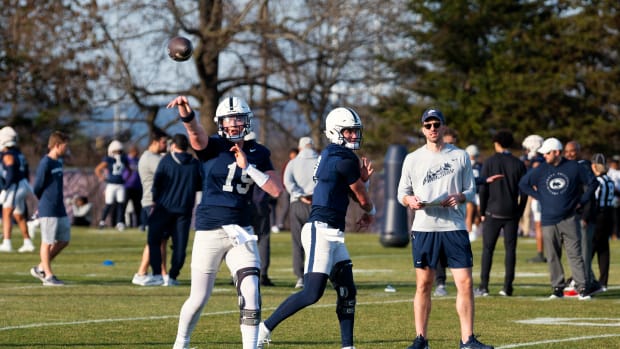Michigan State's Overpaying to Land Mel Tucker Epitomizes a Broken System
The state of college athletics, as viewed through the events of Tuesday, Feb. 11, 2020:
Congress brings NCAA president Mark Emmert to Capitol Hill and tells him and the rest of the association to get its act together. A Senate subcommittee wants a tangible plan for compensating athletes, and Emmert offers none. Later, a Michigan State football coaching search in total disarray finds the only way out—throwing a king’s ransom in salary at a coach with a career 5–7 record to lure him away after one season at Colorado, where he will leave a fresh signing class and everyone else in the lurch.
Is this a great system or what?
Leader of college sports: We are working (at gunpoint) on a means of squeezing out a few eyedrops of money to our most marketable and popular athletes, but it is very complicated, and if this gets out of hand it could ruin everything.
Prominent athletic department, later that same day: We are building a golden throne for a guy who hasn’t proven anything as a head coach—because we can, and because we’re desperate.
College revenue sports have never been as stupid as they are right now—as riddled with hypocrisy and inconsistency, as rife with fiscal irresponsibility, as drunk on revenue, as lacking in strong leadership. Men’s basketball is a diminished product that elite players view as a necessary evil, while administrators remain in denial about the underground economy that ran the sport for decades. Football is an increasing caste system that rewards outrageous and irresponsible spending as the Power 5 conferences stratify into the Power 2 Plus Clemson.
Which brings us back to Michigan State, fortunate member of the Power 2, and Mel Tucker, fortunate drinker from the revenue spigot. This became the latest and greatest example of how dysfunctional coaching searches end these days: just wallpaper over your mistakes with stacks and stacks of cash and hope it works out.
From his yacht in the afterlife, George Steinbrenner approves of this strategy. He would have made a great 21st century athletic director.
With a stopgap AD who had no clue how to run a coaching search and an inept search firm running interference, the Spartans were flailing in their attempts to hire a successor to Mark Dantonio. Of course, the fact that they were trying to replace Dantonio in February, of all times, was symptomatic of modern college football as well—by virtue of a few very good seasons, Dantonio had basically become emperor of the program.
When the Larry Nassar scandal swallowed longtime AD Mark Hollis and the school replaced him with an empty suit named Bill Beekman, Dantonio unofficially had no boss at Michigan State. As his program slid, nobody had the authority to push him into substantive staff changes after the 2018 season. And when the refusal to shake up his program led to more of the same in 2019, Dantonio simply stood still and nobody called him on it. Off-field problems bubbled to the surface—and status quo still reigned in East Lansing. Finally, not long after collecting a $4.3 million loyalty bonus (see emperor reference above), Dantonio suddenly decided to retire on the eve of the February letter of intent signing period.
Highly inconvenient. But such is life with an emperor. They tend to act in their own best interests.
Michigan State set out to find a new coach, partnering with coaching search exec Glenn Sugiyama—not exactly a guy considered to be at the forefront of his profession. The Spartan brass talked to San Francisco 49ers defensive coordinator Robert Saleh and Tucker, the head coach at Colorado. Both pulled out of the running for the job, perhaps sensing that the real target all along was Cincinnati coach Luke Fickell, the ideal man for the job. Then Fickell turned down the job Monday. On Tuesday, a Michigan State trustee said the school didn’t want a “waffling flake,” an apparent shot at Fickell. Later Tuesday, the school landed the waffling flake Mel Tucker, a couple of days after he turned down the job and within hours of him publicly reaffirming his commitment to the Buffaloes.
How did they get Tucker to change his mind? With what The Athletic reported will be an annual salary of double the $2.7 million he made at Colorado in 2019.
Yes, they’re paying at least $5.5 million to a guy who had a losing record in his only year as a head coach, despite inheriting a four-year starting quarterback (Steven Montez) who leaves Colorado as the school’s all-time leader in total offense, and potential first-round NFL draft pick Laviska Shenault at wide receiver. The Buffaloes were outscored by more than eight points per game, with losses to Oregon by 42, Washington State by 31, Utah by 30 and a very bad UCLA team by 17.
This gets a guy more than $5 million a year? Sure it does, when the paying institution has more money than sense.
As of last year, Big Ten schools were raking in more than $50 million in conference revenue shares, and we haven’t even heard the latest numbers yet. The Southeastern Conference announced last month that its latest revenue shares are $45.3 million per school—but that number will jump when its latest media rights deals start kicking in.
Where is the money going? To facilities, sure. But more and more of it is paying for the ballooning staffs that run athletic departments and football programs.
Everyone else is trailing the Big Ten and the SEC, and the gap is widening. The Pac-12, where Colorado plies its trade as one of the less distinguished football members, is the furthest behind of the Power 5 leagues. There is no way Colorado could (or should) come close to matching Michigan State’s offer.
They simply have more silly money to burn in the Big Ten and SEC. We saw that earlier this hiring cycle in a couple of SEC locales.
Missouri whacked Barry Odom after four seasons, a borderline call that would have been more understandable if it had a slam-dunk successor lined up. Instead, that coaching search wandered through the wilderness and looked like it might cost athletic director Jim Sterk his job, before he threw a massive deal at Eli Drinkwitz—six years, $4 million per.
He might end up being a great hire, but this is another guy who had been a college head coach for exactly one season, and at the Sun Belt Conference level. Giving Drinkwitz that many years and that much money was a byproduct of desperation—Sterk had no leverage after whiffing on several candidates and needed a win. So he bought one.
Arkansas was similarly adrift after an in-season firing of Chad Morris less than two full years into his tenure. Out of time and viable candidates, the school paid $3 million a year for five years to Sam Pittman, Georgia offensive line coach. He has never even been a coordinator at the Division I level, much less a head coach.
But Tucker and Michigan State take the market to a new level. And the coach’s one-and-done Colorado tenure further exposes the differences between coach empowerment and player empowerment.
While nobody should blame Tucker for doubling his salary, there is a little Bobby Petrino to this move. The school that gave him his first chance as a head coach was jilted about as quickly as possible, similar to Petrino using Western Kentucky for a season after it awarded him a scandal rehabilitation job in 2013.
Beyond that, there is the sheer hypocrisy of a coach who was quoted as saying in October, “There’s no transfer portal in the real world,” absolutely using the coaching transfer portal to fatten his wallet. Fact is, Tucker has now “transferred” 11 times in his coaching career, bouncing around the college and NFL levels without anyone ever making him sit out a year.
Sure enough, there is a transfer portal in the real world. And Mel Tucker has spent a lot of time in it.
Now he will be one of the richest head coaches in a bloated sport, with no track record to back it up. But this is how it works in college athletics, where administrators who are bad at their jobs throw increasingly bigger piles of money at their problems—but never at the athletes.





